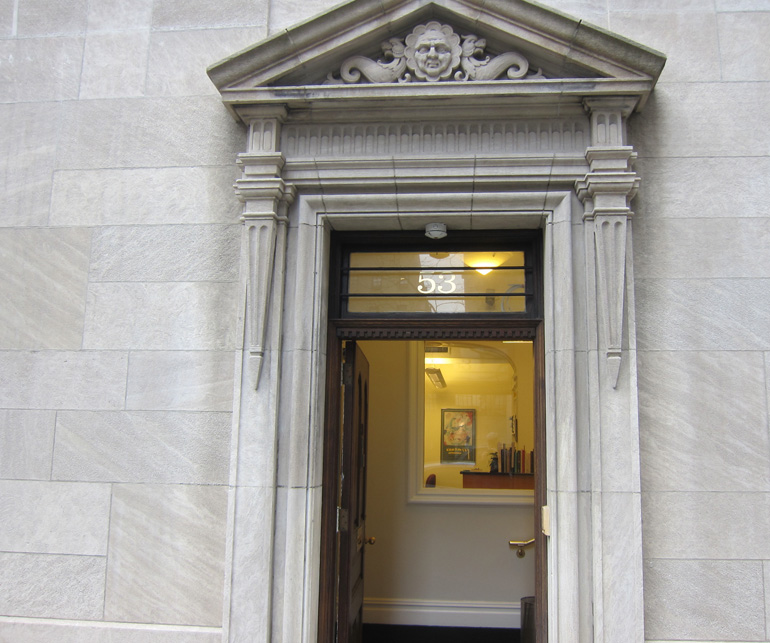Gotham Diary:
The Iron in “Irony”
21 February 2014
For the first time in ten years, I was sent home yesterday from the Hospital for Special Surgery without the benefit of a scheduled Remicade infusion. The reason was a very bloodshot eye. It might be infected. For reasons that I’ve never quite understood, an infusion of Remicade is said to make existing infections much worse. That my eye probably wasn’t infected — that it was, instead, inflamed by precisely the kind of autoimmune attack that Remicade is designed to prevent — cut no mustard with the rheumatologist. He’s not an ophthalmologist, after all; it’s not up to him to diagnose bloodshot eyes. I ought to have called the ophthalmologist on Monday, when my eye began itching. That way, we’d have known for sure. Now we almost do. I’ve been, and the eye has been swabbed, and I’m no longer itching. I’m to take eyedrops every hour on the hour for the rest of today, and then four daily over the weekend. The drops contain both an antibiotic and a steroid; between them, they’ll return my eye to normal in time for the rescheduled infusion, on Tuesday. The ophthalmologist will call the rheumatologist and tell him not to worry.
So, although I’m still dragging myself around, the burden of hopelessness and futility has been lifted. It has been lifted, and I am not going to discuss it: Eccomi. But yesterday was not a good day. Wednesday was not a bad day; Ray Soleil was kind enough spend most of it with me. It was only when, after he left, I began thinking about writing an entry here, that all literary aspiration was snuffed by a rocketing anxiety about how the rheumatologist might respond to the bloodshot eye. I was so alarmed that I unearthed a bottle of eyedrops from the medicine cabinet and began fairly ladeling them onto my cornea. These other, older eyedrops also contained a steroid, so I was not surprised that they made me more comfortable; but they had no real effect on the inflammation. No antibiotic effect, I should say. I looked no better in the morning.
I was so upset by yesterday’s decision that I walked home from the hospital in the wet, my inner despond perfectly matching the outer. You might ask just how depleted I really am. The fact is, anger is a stimulant. Once home, I was a useless rag, an ashen, barefoot Cinderella, good for nothing but watching movies. This morning, I had to wade across a very sizeable swamp of self-pity and misery-me before I could even think about getting dressed.
I was so encouraged by the ophthalmologist’s preliminary opinion this morning that I walked over to Madison, popped into a taxi, and treated myself to lunch at Demarchelier.
***
I finished reading The Wings of the Dove in the morning yesterday, and surely a small portion of my unhappiness later in the day owed to missing it, to being done with it or to its being done with me. At lunch today, by which time I was once again capable of thought, I was amazed by the novel’s perversity, mentioned by John Bayley in the introduction to the Penguin Classic edition of 1986 but not really explored. I’m not up to much exploration myself at the moment, but I’ll venture this: imagine that Maud Manningham Lowder, the wealthy and far from malignant dragon in the novel, really existed, and had taken out a sort of patent on all of the interesting facts behind the story that Henry James set out to tell us, and then refused permission for the author to be specific about any of them.
All of the things that would stuff a conventional novelist’s budget are withheld. The list of things that we don’t really know is almost as long as the novel itself. All we get are hints. What’s the disgraceful, “bad” thing that Kate Croy’s father did? Who was Mr Lowder? Does Merton Densher have a family? What’s Lord Mark’s last name? Where did Milly’s millions come from? What catastrophe wiped out her family, leaving her alone to own everything? And what’s wrong with her? We’re only told that it isn’t what she thought it was, but something else. I’m not kidding! And the really theatrical scenes, such as Densher’s final interview with Milly, are shunted “offstage.” We don’t witness any of them.
All of this suppression, of course, makes the moral drama of the novel throb unremittingly. We are never distracted from it by “interesting background.” Such stuff is of no interest to the three principals (and even less to the wonderful Mrs Stringham) as they weather, aware of doing so or not, Kate’s conspiracy, and we’re left with nothing to do but to judge, from page to page, just how wicked (or not) her scheme really is.
More anon, though, after I’ve copied out all the flagged passages — something that I can once again imagine living to do. Another book of recent interest is the Melville House publication of four interviews given by Hannah Arendt, as part of its “Last Interview” series. I recommend this book very highly, because it is a serious exposure of Arendt’s thought in a highly readable format. It is not a substitute for reading her big books, but I believe that any serious reader, otherwise unacquainted with her writing, will be moved by it to explore further. There are also topical matters, relating to current events at the times of the interviews, that wouldn’t pop up in books; one of these, which I take to be an eloquent if tacit indictment of Henry Kissinger’s baleful influence on the political culture of this country, I hope to mention next week.
Right now, though, I have a swamp to drain. The blue room is a mess!

